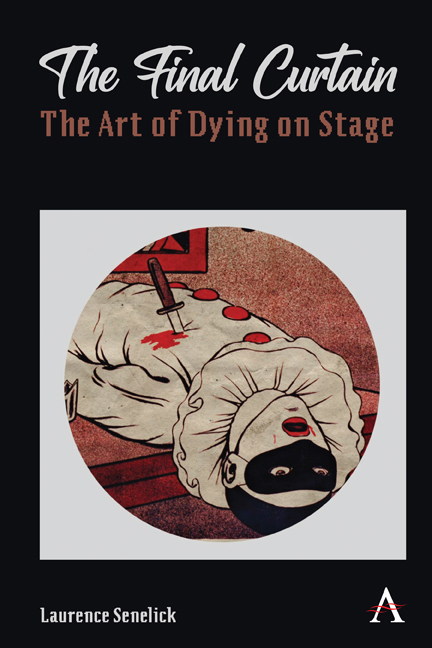4 - Sick unto Death
Published online by Cambridge University Press: 15 September 2022
Summary
Her soul was on her lips, as she whispered again,
“Bury me in the garden, mother— bury me in the”
— and a slight quiver came over her limbs— one
feeble struggle and all was still.
The Early DeadOver Her Dead Body
Actresses had fewer opportunities to display virtuosity in their demise. They generally served as victims at the mercy of their male partners. A major obstacle to women vying with men in flamboyant stage deaths was social attitudes to female modesty. The ancient taboo on women appearing in public conspired with the equally hoary fear of women out of control to prescribe severe limits on their portrayals of madness, unruliness, and dying. There was something more than indecorous, almost indecent about the physical exertions required by a memorable display of death throes.
Animadverting on Eliza O’Neill's ear-curdling shrieks, eye-rolling, and guttural death-rattles, William Hazlitt offered the Regency-era consensus:
This was carrying reality too far. The sufferings of the body are no longer proper for dramatic exhibition when they become objects of painful attention in themselves, and are not merely indicative of what passes in the mind— comments and interpreters of the moral scene within.
This might be applicable to a performer of either sex who challenges notions of the ideality of art. However, Hazlitt goes on, what's worse is the contradiction between O’Neill's “form and delicate complexion, and the violent conflict into which she was thrown.” He compares her with a little flower contending with a storm. By “pushing truth and nature to an excess,” she was marring her delicate beauty. The following age might add that she was offending modesty. When Clara Rousby in her signature role as Joan of Arc was burned at the stake, the critics concurred that it was a disgusting sight, despite her manager contending “she is burnt only a little.” The need for a dramatic actress to be ladylike confined her to conventional attitudes and actions.
Neoclassic drama offered few if any opportunities; the more grisly Jacobean dramas were seldom revived. Shakespeare was therefore the welcome exception. Some Juliets hoped to outdo or at least match the flamboyant finales of their Romeos.
- Type
- Chapter
- Information
- The Final CurtainThe Art of Dying on Stage, pp. 97 - 122Publisher: Anthem PressPrint publication year: 2022



